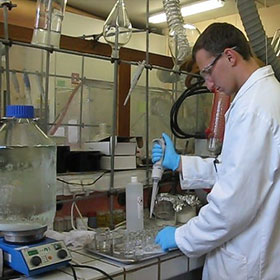The side-effects of being an ESR in Montpellier

Allan Gordon, the PROMIS project coordinator from Lancaster, or the guy behind the scenes as he calls himself, asked us to write about our experiences of being an Early Stage Researcher (ESR). Where to begin? Of course with small talk!
I am living right now in Montpellier and when somebody not from Montpellier asks “How's the weather?” my answer is nearly always “Sunny.” For this reason most people from Montpellier speak less about the weather, but some small talk can start when people remark my accent and ask where I am from and what I do in Southern France. This has led to many funny conversations about differences between wine and beer culture… Sometimes a chat leaves the ground of small talk and I explain that I am in Montpellier for my PhD studies. This can lead to talking about a mobility grant which makes people move to a European country in which they have not worked and studied for the last three years. Most of the time the conversations do not go further in that direction, but if it does, then I can mention that we are in total 15 PROMIS PhD students, all sharing the experience of having moved from one country to another for professional reasons. Fifteen students in 6 European countries. In every hosting institution at least two local supervisors and then the coordination from Lancaster. There are at minimum two network meetings per year, every time at a different partner institution and by that always in a different country. Despite all the traveling, the work is done locally and ideally collaborations cross-national boundaries emerge.

As I wrote above, my hosting institution is in Montpellier and right now I oscillate a lot between working at a public research institute and a local industrial partner. Since the beginning of my time as an ESR I am asking myself about the consequences of this EU governance framework. What does it do? With me, with my family and friends, with my colleges in Montpellier, with the participants at the PROMIS events? The older supervisors might remember times when collaborations of European partners have been more complicated. For all the Erasmus generations since 1987 it is rather normal.
In the first place, the ESR position enables me to do research. I could describe in much details what I am doing on a daily basis, but I rather prefer to write about the side-effects of the Marie-Curie program as it might interest a larger audience. The governance frame with the obliged cross-national mobility leads to rethink the concept of nations in science. I had an interesting discussion with a colleague who felt much attached to the French state by the simple reason that it was the French society who enabled her to study by not asking any student fees from her. In analogy to some ideas of Marcel Mauss one could write that the gift of a free university education can create the feeling of an obligation. So what about me? I receive money from European tax payers. I cannot say that I am payed by someone specific from England, Italy, Greece, Germany, or Spain, because it is not national money which is spent. In some sense I feel obliged to the European society as my colleague feels obliged to the French society. Maybe this is a side-effect of being an ESR: loyalty to the employer, which is for us the European people paying taxes.
Another important aspect is the cultural adaptation process which has different phases. Everyone who has already lived abroad knows that sometimes people in the host country just don’t behave “normal”. There are different cultural practices and not only a foreign language has to be learned but as well “foreign” cultural behaviour. Luckily I could already speak fluent French before I started in September 2015. I write luckily because although English is the language of science, it is not the language spoken in the corridors of the institute and at lunch. How many jokes and how many wise comments about good food would I have missed if I didn’t speak the language? Definitively too many. Culturally France and Germany are rather close (on a global scale) and having already lived in France as an Erasmus student I had a very smooth start and no cultural shock. Despite this feeling of “normality” there were and are nevertheless moments of irritation.
When it comes to the status of the PhD-title I still have some problems to understand the French way. At the first-year welcome reception of my Graduate School I was expecting to hear some nice words to encourage us on our challenging way of intellectual pursuit. Instead a professor spoke about the relevance to acquire business related skills during our PhD time to avoid becoming unemployed afterwards. Instead of congratulating us for having sufficient funding to start a PhD project, instead of telling us about a challenging and rewarding time with an interesting future and career options, he spoke about unemployment. Then a young PhD absolvent spoke about her difficulties to find a job after graduation and she made a comment about competing on the job market with absolvents of elite schools without PhD diploma. I started to became interested and read a OECD study [1].
In the study from 2013, the authors write that “the average unemployment rate for total graduates at the doctorate level is roughly three percentage points lower than that for other tertiary level graduates aged 25 to 64 for the economies for which data are available, confirming the already well established fact that employment prospects improve with the level of degree” (p. 13). They further write that “a noticeable exception to this is the case of France where it seems that the French dual education system has an impact on the labour market outcome of those graduated from universities compared to those from the so-called ‘grandes écoles’ (higher schools). Still, the 2010 unemployment rate of French doctoral graduates three years after the receipt of their doctorate remains high (at 7%) as compared to that of the other countries” (p. 14). In my words: PhD holders in France face problems entering the non-academic job market. Historically the French educational system did not produce significantly more doctorates than position were available in academia. By following the OECD trend, France has increased the number of PhD-students without increasing the number of traditional academic jobs. This makes a transfer to other sectors inevitable and the competition of PhD holders with absolvents from university like institutions called ‘grades écoles’ is the consequence. As the application of PhD-candidates for non-academic jobs is a “new” phenomenon in France, it seems that human resource departments still favour absolvents of higher schools. It will be interesting to evaluate if approaches like that of our Montpellier Graduate school to provide courses about business related skills will increase the employability and will in the long run influence the French PhD anomaly…
Coming back to the beginning of my text I have to confess that OECD studies and unemployment rates are not really good small talk topics and maybe it would be much better to end this text on the tune it began. So to sum up: Being an ESR in Montpellier creates a double loyalty; to my local employer and then to the European tax payers. By participating at the European network meetings, the perspective changes regularly from regional to international. The exchange with the other ESR at these meetings allows to learn about cultural particularities like the French PhD anomaly and to discover that there are different scientific management practices at each of the network partner institution. In my opinion these exchanges are very valuable as they allow us to understand better the diversity of the European scientific, cultural and industrial landscape and to grow personally.
[1] R. Freeman, L. Auriol, and M. Misu, “Careers of Doctorate Holders,” OECD Science, Technology and Industry Working Papers 2013/04, Nov. 2013.
Mon 03 October 2016
